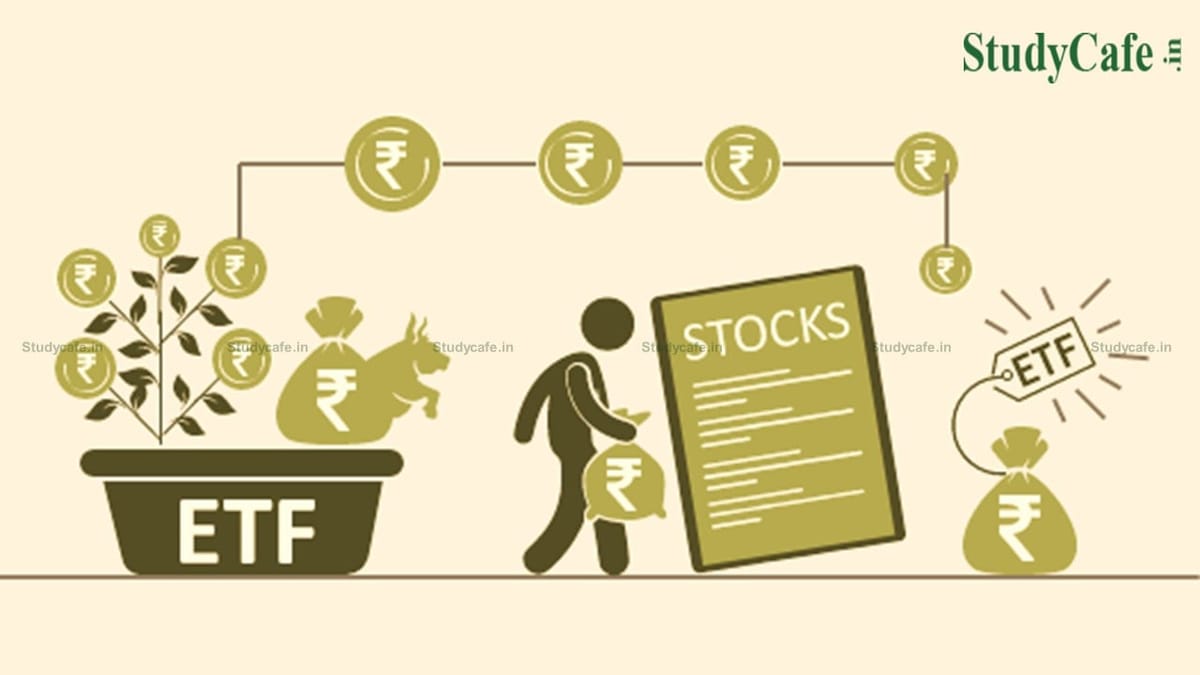Deepshikha | Feb 28, 2022 |

Everything You Need to Know About ETFs
Exchange-traded funds (ETFs) are passive investment vehicles that track the performance of an underlying index. In other words, an ETF is a portfolio that closely resembles the makeup of an Index. ETFs are passively managed funds that track the performance of an index rather than being actively managed by a portfolio manager. They don’t try to outperform their benchmark indexes.
On a stock exchange, these can be bought and traded. ETF prices fluctuate throughout the day. The net asset value of the underlying asset or stocks in it determines its value. Individual investors may find ETFs appealing because they are extremely liquid and can be purchased for a cheaper fee.
Index fund ETFs are ETFs that are passively managed and have the goal of tracking a stock market index. For instance, the Nifty 50, Bank Nifty, and the BSE Sensex. When an investor buys an Index ETF, he or she is buying a piece of the portfolio that includes the stocks of the underlying index.
Gold exchange-traded funds (ETFs) monitor the performance of gold bullion. The prices of gold ETFs are determined by gold market prices. When gold prices rise, so does the value of the gold ETF, and when gold prices fall, so does the value of the ETF. There are mutual funds in India that allow clients to invest in gold-related ETFs.
To improve the potential returns of an underlying index, leveraged ETFs invest in debt or derivatives. These forms of ETFs, however, are now unavailable in India. These are good options for short-term investing.
Bond ETFs are similar to bond mutual funds in that they invest in bonds. Bond ETFs are a type of exchange-traded fund that invests in bonds that are traded on the stock exchange. G-Sec Long Term ETF and SBI ETF 10 Year Gilt are two bond ETFs available in India.
A sector exchange-traded fund ETF invests in stocks of a specific sector. They are exact replicas of the sector’s benchmark index. A banking sector ETF, for example, invests in bank stocks and tracks a banking index. They are managed to capture the profits from a specific industry. The returns are almost identical to the benchmark index.
Currency ETFs are passively managed ETFs with the underlying securities of one or more countries’ currencies. They intend to provide forex currency exposure. These funds are used by investors to reduce their risk in the currency market. Some people use these ETFs to protect themselves from major economic events.
An inverse exchange-traded fund (ETF) is made up of multiple derivatives. The drop in the value of the underlying benchmark benefits investors in these ETFs. Investing in inverse ETFs is akin to having a market short position with the intention of repurchasing it at a lower price. In other words, when the underlying index value falls, investors can profit without having to sell short. By betting on the market falling, inverse ETFs take diverse future positions. When the market falls by a specific percentage, the ETFs gain that percentage after fees are deducted. These ETFs have slightly higher fees and commissions than regular ETFs.
An ETF, or exchange-traded fund, invests in a group of stocks or equity instruments that make up the underlying benchmark index. These solely invest in equities and thus track just equity indexes. The most popular equities ETFs in India track the Nifty 50 and the Sensex.
Commodity ETFs invest in physical commodities or futures contracts and track the performance of a commodity index. Item indices can track a single commodity or a group of commodities such as agricultural products, precious metals, and natural resources. These ETFs are popular because they allow investors to gain exposure to commodities without having to learn about commodity derivatives investment.
ETFs have recently surpassed other investing options in popularity. ETFs have been popular among investors who find it difficult to study and choose a stock to include in their portfolio.
The indices on the NSE are replicated by ETFs. They want to generate returns that are similar to the gains of the index’s securities. ETFs are divided into four categories: equity, gold, world indices, and debt.
Equity ETFs combine the advantages of stock investing and equity mutual funds into a single investment instrument. Furthermore, because the ETFs match the index, their holdings are completely transparent.
Gold Exchange Traded Funds combine the freedom of stock investing with the ease of gold investing. The NSE’s cash market has gold funds available. These gold ETFs, like the others, are passive investments in gold bullion. These aren’t actively managed funds, either. The gold fund’s price is decided by the current rate of the underlying asset, which is gold.
Domestic investors can invest in overseas indexes through Global Equity Exchange Traded Funds.
An investor can invest in debt ETFs to gain exposure to fixed-income securities. Debt ETFs combine the advantages of investing in debt securities with stock and mutual fund investments.
Investing in ETFs is similar to investing in stocks. ETFs, like any other stock, are traded on the stock exchange. As a result, having a Demat account will suffice. These ETFs, like stocks, can be acquired on margin, sold short, or held for a long time.
When compared to single stock investing, ETFs provide diversity. It allows the investor to participate in a variety of markets, industries, geographies, and asset classes. Because ETFs are a collection of stocks, they are traded in large volumes. These huge volumes imply a high level of liquidity. As a result, entering and exiting the positions is extremely simple.
In case of any Doubt regarding Membership you can mail us at contact@studycafe.in
Join Studycafe's WhatsApp Group or Telegram Channel for Latest Updates on Government Job, Sarkari Naukri, Private Jobs, Income Tax, GST, Companies Act, Judgements and CA, CS, ICWA, and MUCH MORE!"